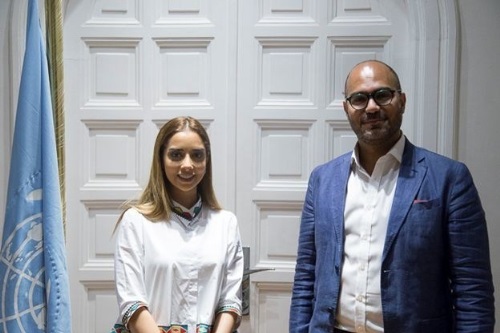 UN Women announced the appointment of award-winning, Emirati-Yemeni singer, Balqees Fathias the first Planet 50-50 champion for the Arab States Region. Focusing on young women and girls, Ms. Fathi will be working closely with UN Women to push for young women entrepreneurship in the region and to advocate for the rights of women survivors of violence with a particular violence on child marriage.
UN Women announced the appointment of award-winning, Emirati-Yemeni singer, Balqees Fathias the first Planet 50-50 champion for the Arab States Region. Focusing on young women and girls, Ms. Fathi will be working closely with UN Women to push for young women entrepreneurship in the region and to advocate for the rights of women survivors of violence with a particular violence on child marriage.
Fourteen per cent of the region’s girls marry under the age of 18- an alarming form of violence against women which usually starts a long chain of other forms of violence and health repercussions. With the refugee crisis tearing through the region since the beginning of the Syrian conflict five years ago, the rate of child marriage in refugee communities is raising even more rapidly at an alarming rate. In Jordan, for example, the rate of registered child marriages in refugee communities increased to 18 per cent in 2012 compared to 12 per cent in prewar Syria. The number again skyrocketed to 25 per cent in 2013 and continues to grow unchecked.
“The voices of young women in the region are drowned by the hefty problems of conflicts, the refugee crisis and dire economic conditions. Balqees’s dedication to reach out to and advocate for young women is of great value at such a time. Her focus on women’s economic empowerment and violence against women and girls is a perfect match with UN Women’s vision that the two subjects are highly interlinked,” said Mohammad Naciri, UN Women Regional Director for Arab States.
For the past few years, UN Women has designed and implemented regional and national programmes across the Arab States Region that push for women’s economic independence as one of the main solutions to violence against women and girls including in refugee communities. Several one-stop shops run or supported by UN Women in the region offer vocational training and support women’s employment and entrepreneurship.
UN Women’s programmes and advocacy have also focused on women entrepreneurship and women’s economic empowerment not only as tools to achieve equality, but also as an added value to societies. Time after time, studies have shown that women’s economic participation adds millions to countries GDP and strongly contributes to healthier economies for all.
In her twenties, Ms. Fathi had started her advocacy for women’s rights and gender equality early on by participating in public awareness campaign and using her vast digital reach to reach out to millions of women across the region. In 2015, she visited Yemeni refugee camps in Geboti to help raise public awareness about the status of Yemeni refugees.
“For me, this is the social responsibility of artists, to support their communities as long as they have an influence,” Ms. Fathi said during a visit to UN Women Regional Office for Arab States, “It is an honor to be here because it means I have a chance to be part of a collective effort to actually make a difference.”

